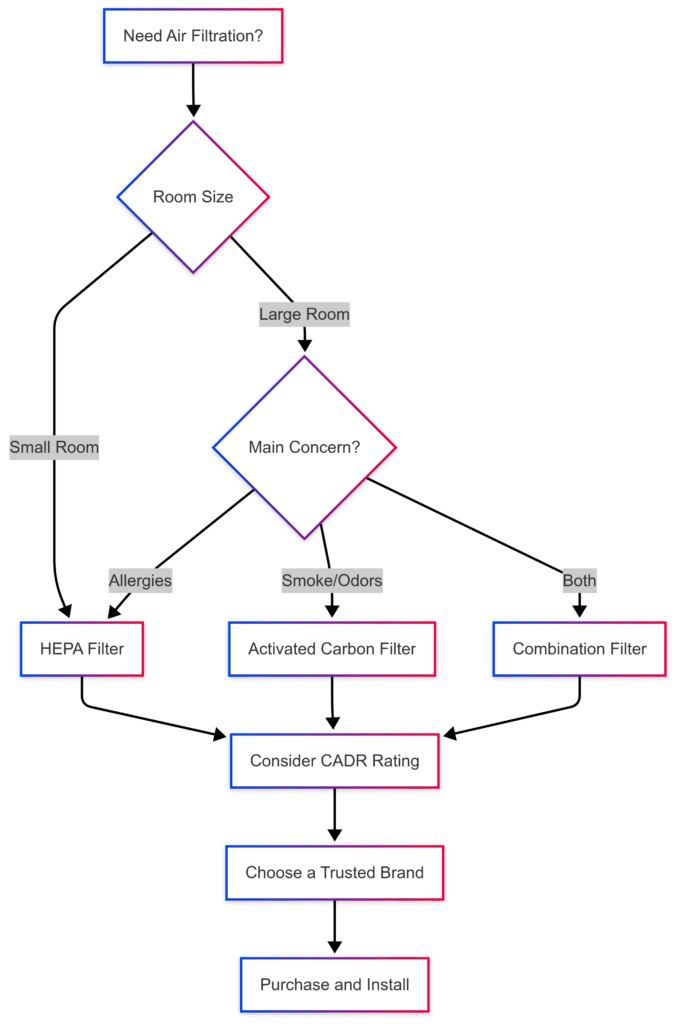
Imagine coming home after a busy day and immediately noticing a fresh, clean scent greeting you. For many, this comforting experience is increasingly possible due to the popularity of smart air purifiers, which promise not only cleaner indoor air but also convenience through advanced technological features. Smart air purifiers leverage technology to offer real-time air quality monitoring, remote app control, and automatic adjustments, making indoor air healthier with minimal effort.
However, a key question remains: Are these smart air purifiers environmentally friendly? This article examines the eco-friendliness of these devices from multiple perspectives, including their energy consumption, manufacturing processes, waste management, and overall longevity.
Understanding these factors is especially crucial for adults, a demographic largely consisting of homeowners, parents, and health-conscious individuals. These groups typically prioritize both health and sustainability, seeking solutions that protect their families and the environment.
As part of your commitment to sustainability, FiltersFast.com offers eco-friendly and efficient air purifier filters to help maintain healthy indoor air quality without compromising environmental responsibility. Explore FiltersFast.com here.
The Rise of Smart Air Purifiers and Indoor Air Quality Concerns
Indoor pollutants such as volatile organic compounds (VOCs), allergens, dust, and mold pose significant health risks, including allergies, asthma, and chronic respiratory conditions. Awareness of these issues has surged, particularly in the wake of the COVID-19 pandemic, prompting increased demand for air purification solutions.
Smart air purifiers have emerged to address these concerns through features such as real-time sensors, mobile app connectivity, and automated purification modes. Their popularity has soared due to consumer desire for convenience, health consciousness, and advanced technological solutions.
Yet, this advancement raises important environmental considerations—how do smart technologies impact the planet?
Energy Consumption and Efficiency
Smart air purifiers generally consume more energy than traditional models due to their sensors, Wi-Fi connectivity, continuous monitoring systems, and digital interfaces. However, smart features such as automated scheduling and energy-efficient motors help offset some of this increased usage.
When selecting smart air purifiers, consumers should prioritize models with Energy Star ratings, as these are certified to meet stringent efficiency standards. Practical steps like proper device sizing, strategic placement, regular filter maintenance, and utilizing sleep modes can further optimize energy efficiency.
FiltersFast.com supports consumer sustainability efforts by offering an extensive selection of energy-efficient replacement filters. Check available options.
Material Usage and Manufacturing Impact
Smart air purifiers utilize various materials, including plastics, metals, and sophisticated electronic components, whose extraction and processing contribute significantly to environmental degradation. Notably, electronics often rely on rare earth metals, the mining of which carries severe ecological implications.
Compared to simpler models, smart purifiers involve more intricate manufacturing processes, resulting in higher carbon footprints. Additionally, environmental impacts related to shipping, packaging, and distribution must be considered. Consumers can advocate for and support manufacturers employing sustainable practices, such as using recycled materials and eco-friendly packaging.

Filter Disposal and Waste Management
Smart air purifiers typically use disposable filters such as HEPA and activated carbon, which are not biodegradable and contribute to landfill waste. Frequent replacements increase environmental burdens, emphasizing the need for sustainable alternatives.
Reusable or washable filters present a valuable eco-friendly option. Additionally, recycling programs for air purifier components can help mitigate waste. Electronic waste (e-waste), exacerbated by smart devices, also demands attention. Manufacturer responsibility, through initiatives like Extended Producer Responsibility (EPR), is critical to reducing these impacts.
FiltersFast.com offers sustainable and recyclable filter options, assisting consumers in managing filter waste responsibly. Explore sustainable filters here.
The Smart Technology Dilemma: Longevity and Upgrades
Rapid technological advancements frequently shorten smart devices’ lifespan due to planned obsolescence and compatibility issues with software updates. This leads to premature device replacement, compounding environmental impacts.
Repairing or upgrading smart purifiers can be more challenging compared to simpler models. Modular designs, repair-friendly products, and long-term software support represent potential solutions. Consumers should advocate for designs emphasizing durability and repairability to minimize waste.
Consumer Choices and Recommendations
Making environmentally conscious choices involves selecting smart air purifiers with recognized eco-certifications like Energy Star. Consumers should assess long-term environmental impacts when purchasing and prioritize sustainable manufacturing practices.
Responsible disposal and recycling of filters and devices are essential. Engage manufacturers by asking about their sustainability initiatives and practices.
FiltersFast.com supports environmentally responsible purchasing decisions with a range of sustainable filter solutions. Visit FiltersFast.com for more details.
Conclusion,
Smart air purifiers offer significant health and convenience benefits, but their environmental impacts require careful consideration. Balancing indoor air quality with environmental sustainability is crucial.
Informed consumer decision-making and advocacy for sustainable practices can drive eco-friendly innovations in the industry. Consumers are encouraged to responsibly utilize and advocate for air purifiers that consider both human health and environmental well-being.
Finally, consider exploring FiltersFast.com as part of your eco-friendly living strategy, supporting both your health and the environment. Explore your options now.

